On Sunday, Oct. 1, everyone’s favorite astrophysicist Neil deGrasse Tyson will bring his splashy talk show “StarTalk” back to the National Geographic Channel for its fourth season. The often hilarious show links complicated scientific ideas with pop culture, pairing blockbuster stars and athletes with academics (the season’s first episode, for example, brings together Lance Armstrong with experts on the energy of bicycling and sports ethics).
Future guests range from Jane Goodall, Katie Couric, and Stephen Hawking to Stephen Colbert, who Tyson says digs into fake news and “the importance of facts in an informed democracy, because scientists are in the business of knowing what is true.” More than that, though, Tyson says he sets out through his show to discover his guests’ hidden connections to science. He learned, for instance, that Colbert’s father “was a medical doctor in the Deep South, and not everyone around him had this exposure to the rational thinking of a learned man of science, so we talked about what that felt like in school.” These kinds of stories, Tyson says, make it clear how just often science touches all of our lives.
Tyson spoke with GOOD about why this gives him hope for America — along with his thoughts on what can be done about climate change and our political future, as well as whether the solar eclipse was really a big deal or not.
Last time we spoke, you said you love to bring on guests who can teach you about things you don’t already know. What's the most surprising thing you've learned so far this season?
There are many, but let me give the top two. One of them had to do with Kareem Abdul-Jabbar. People who are fans of his know he actually cameoed in a couple of movies. Part of him always wanted to be an actor, and I said, “Look, dude, you're 10 feet tall. There’re no roles for you.” “Yes there are.” I said, “What?” He said he wanted to play Chewbacca on “Star Wars.” And I said, “Of course!” That is the role for him. This is him revealing a little bit of geeky underbelly that he was a “Star Wars” fan, and he wanted a little piece of that action, so I was delighted to learn this.
The second has to do with Katy Perry — I was delighted to learn how curious she is as an adult. Curious — not as in weird but as in childhood curiosity. Childhood wonder about the unknown. She had a very sincere and honest sort of curiosity that I was delighted to see, and I made it clear to her that when you have that kind of curiosity and you carry it into adulthood, you're basically a scientist. That's what scientists are: Kids who never really grew up. But we did grow up, and we just have more expensive tools to satisfy that curiosity — the microscope, the telescope, the particle accelerator, the space telescope, the Petri dish, the geologic survey, whatever it is. And so, this is a woman who’s in her mid-30s. Her last year in school was when she was 15, having graduated with a GED. And you wouldn’t think that someone that many years out of school who stopped at a GED would have that level of curiosity. I was delightfully surprised.
This is getting into another question I had. There was kind of a Twitter dustup a little while ago about flat-earthers and how you think educators need to be better at establishing curiosity in students as they grow up. Do you see your show as a stopgap to help make Americans more curious?
So, it's not a kids' show. We do have sex, drugs, and rock and roll occasionally, and it airs very late at night at 11 p.m. I’ve never thought of it as a matter of how can we influence the kids — especially since adults are responsible for all that is wrong with the world. For me, I'm always targeting adults rather than kids because adults can fix things overnight and make everything perfect for the next generation. You can make a perfect “next generation” of kids, but then you've got to wait around 30 years until they're actually in charge of anything, and I'm not that patient.
[quote position="left" is_quote="true"]Do you know who is heeding the warnings of scientists? It's insurance companies and the military.[/quote]
My goal with the show is that I'm trying to achieve a comfort level for you with regard to discussions about science. If you come for the celebrity and you stay for the science, the science is attached to things that you otherwise care about deeply — be it the celebrity him- or herself or some other pop culture subject that you care about that then gets infused with all the ways science affects it. And as a result, I'd like to think by the end of the show, you have warmed up to what science is. It's not just some class you took in school and you forget about after you sell back the textbook. You recognize that science is everywhere —it touches us at all times. And that comfort level for me can be transformative to our country. You can turn a sleepy country into an innovation nation by accomplishing this. It's all a matter of stimulating and promoting curiosity because when you're curious, you want to find answers, and you won't accept just what anyone tells you for an answer. You'll go out and get the answer for yourself.
You recently said, we're in the Divided States of America, presumably due to Trump’s election. But we came together for the eclipse. Do you think there’s hope for re-establishing more wonder and awe in American society?
There have been slow but steady and measurable improvements or advancements in the public's appreciation of science, and my evidence for this is manifold. Holding aside for the moment my own work that I can tell you about because I think matters in this equation, there's a website and Facebook page, for example, called IFLS, short for I “Freaking” Love Science. It's got 30 or 40 million likes [editorial note: 25,742,594 as of publication], and my Facebook page has like 4 million likes, so it's 10 times more than anyone who's coming my way. Whatever force I am in this landscape, I am not not the biggest force.
There's the popularity of the TV series “CSI: Crime Science Investigation.” Good-looking young scientists solving crimes, taking numbers, and taking names, and they're fully-fleshed out human beings who fall in love and who love and hate, and they're not just caricatures of a scientist. They're real people who happen to be scientists, and that enables people who say, “Gee, I want to be a scientist too.” “The Big Bang Theory,” the TV series, is often the No. 1 show on television in any genre, and though they may be caricatures and had some early criticism about their portrayals, they weathered these criticisms, rivaling seasons of “M*A*S*H,” “Mary Tyler Moore,” and other classic long-running TV shows. And look at the people who attend ComicCon: Hundreds of thousands of people in multiple cities. These are people who know science, who care about science, and enjoy fantasy and science fiction.
I think it's slow but real, and there'll be a point where the population of science fans is large enough that we would never imagine voting for someone who was scientifically illiterate, and the day that happens, the country will transform overnight, and we’ll become an innovation nation, inventing the future that we all dreamt of 40 years ago [with the space race], but that never happened.
Speaking of “innovation nation,” an issue in dire need of innovation right now is climate change. Over the summer, there was that New York Magazine article that basically said, it's too late — we can't do anything about this anymore. But I’ve also heard that the doomsday narrative isn’t totally true or helpful, and a recent study from Oxford indicated that perhaps we have a little more time to shift gears and meet the Paris Climate Agreement goals if we actually kick into action. From your perspective, can we actually slow climate change enough that we’ll avoid a future where we've got a Hurricane Maria hitting us every single day? Is it healthier to talk about doomsday or to focus on solutions?
I don't see why it's either/or. We're influencing the environment, and that needs to stop if we care about the future of civilization as we have come to create it. The Earth has spent 10,000 years or so with relatively stable climate, which is the conditions under which we develop this civilization that we now enjoy. It accounts for why the world's greatest cities are on the water's edge, enabling transportation and commerce especially. But as waters become more ferocious, and tidal swells become higher, as storms intensify, our cities become at risk, and low-lying countries become at risk.
Do you know who is heeding the warnings of scientists? It's insurance companies and the military, especially the Navy, who cares about where coastlines are. They are thinking deeply and caring about this strategically because it is destabilizing on an international landscape. Even if we stop burning fossil fuels tomorrow, there's still a time lag in the oceans, and they’ll still absorb carbon dioxide and heat energy. Things will get worse before they get better. If we don't stop tomorrow, things will get worse and then get even more worse. So to say, well, we can't do anything about it anyway so let's not do anything — I don't know what kind of thinking that is. Who thinks that way? What does that even mean? So, oh yeah, you put the knife in my back six inches. It's already there. No need to pull it out because the hole has already been cut into my body. I just don’t understand that line of thinking.
[quote position="full" is_quote="true"]The scientific method is do whatever it takes to not fool yourself into thinking something is true that is not or that something is not true that is.[/quote]
Also, a scientifically objective truth is never established by a single paper, contrary to what journalists would have us all think. Journalists will find a single research paper published in a single journal and frame the headline as if the finding conflicts with the full consensus that has been established by other observations and other data over the years. They'll say this could be the next truth, and then everyone is alarmed. Now you're just doing your job — you're reporting on what's out there — but there ought to be another line of reporting that says here is what these thousand research papers show, and this is the emergent consensus from those research papers. Are you going to base policy on this or that single other research paper that just came out or this other one that I found five years ago? If you want to base policy on those singular papers, then you do not understand what science is and how it works.
As an educator, I would encourage schools to think about this. Science is not a body of knowledge. It is a system of thought and of checks and balances. You know what the scientific method is? I'll tell you what it is. I'm going to tell you a way no one has ever told you: The scientific method is do whatever it takes to not fool yourself into thinking something is true that is not or that something is not true that is. That's the scientific method. And the National Academy of Sciences compiles and digests multiple scientific papers, and the press should be talking about what comes out of the National Academy of Sciences because it is their job to advise Congress and the executive branch on all the ways that emergent science can influence policy as well as laws.
One final question. It seemed like you weren't overly impressed with the eclipse from your comments on Twitter, so I wonder: If that wasn't your most wondrous scientific moment of the year, what was?
No, I would say the eclipse. As an educator, to watch how many people engaged the eclipse — in the United States, there were 200 million people in a day's drive of the path of totality. I think the numbers are still out, so we don't know how many people observed this eclipse in totality, but it may be the most observed eclipse ever in the history of the world, and that would just be really cool to know that, and it has the potential to be that. So definitely the eclipse, one of nature's greatest spectacles. My point was, they happen every couple of years. You’ll have to travel to the next one if you want to see it, but in modern times, people do travel. We have planes, trains, and automobiles. So don't think of it as a lost opportunity if you missed this one or were not in the path of totality. There are plenty more before you die, unless you're like 120 or something.
I wanted to add something, though. The rise of science and every case I gave you goes beyond me or anything I could have possibly orchestrated of influenced. I am shocked every day, but it's a fascinating reality that I have 9 million Twitter followers. That's a crazy number, and I want to tell everybody, “Look, guys, do you know you're following an astrophysicist? You can still get out.” It's more than Bill Maher or others who are pundits who everybody knows about and hears about and have their own show, and we all talk about them, and they're controversial. This tells me not that people care about me, but that people care about science. Not only that, my most recent book was No. 1 on the New York Times best-seller list for at least 11 weeks. We should celebrate anytime anyone's science book gets anywhere on somebody's best-seller list because that list is typically filled with pundit books and celebrity tell-alls and athlete memoirs and self-help books. To see a science book anywhere on this list, on anybody's list, is an achievement. It means there is more than just the politics of this world that people are caring about. Maybe they need an escape because goodness knows, the universe is an escape relative to everything else that's going on in the world.
Because we seem small in comparison?
I'm just saying how many days in a row can you talk about the president or about Congress or about the budget? How many days can you sustain that? Do you need or want something else to think about? To talk about? To reflect upon? And in that book, the very last chapter is called “Reflections on the Cosmic Perspectives.” If you ever think about getting the book, you can just read that last chapter, and that's my heart and soul of everything I care about. You can ignore the rest of the book if you want! It's called “Astrophysics for People in a Hurry,” so if you're in a hurry, it's for you, but if you're in a really, really, really strong hurry, just go to the last chapter. This collectively is evidence that science is starting to matter in this world, in the United States, and for me, that signals great things for the future of this country because there is no future of this country unless we embrace the innovations of science, technology, engineering, and math in which we find the engines of tomorrow’s economies.
















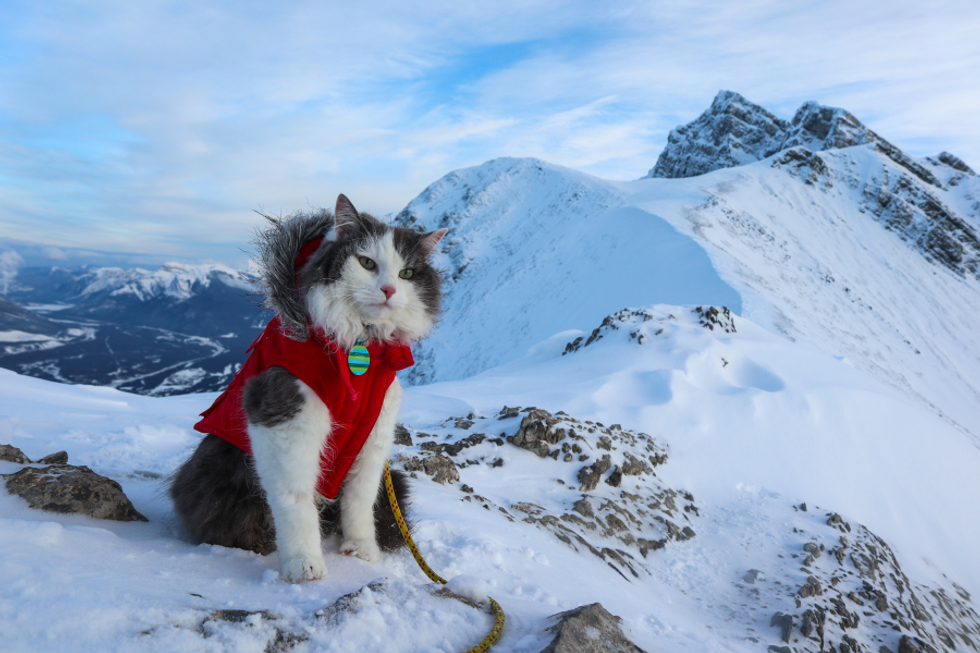 Let us all bow before Gary, the Internet's most adventurous feline. Photo credit: James Eastham
Let us all bow before Gary, the Internet's most adventurous feline. Photo credit: James Eastham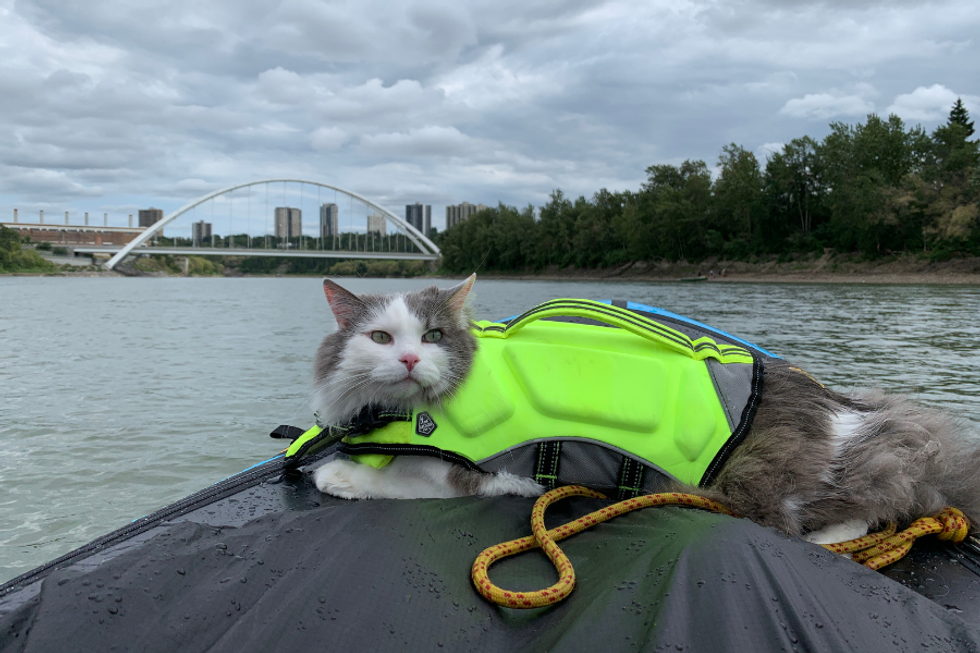 Gary the Cat enjoys some paddling. Photo credit: James Eastham
Gary the Cat enjoys some paddling. Photo credit: James Eastham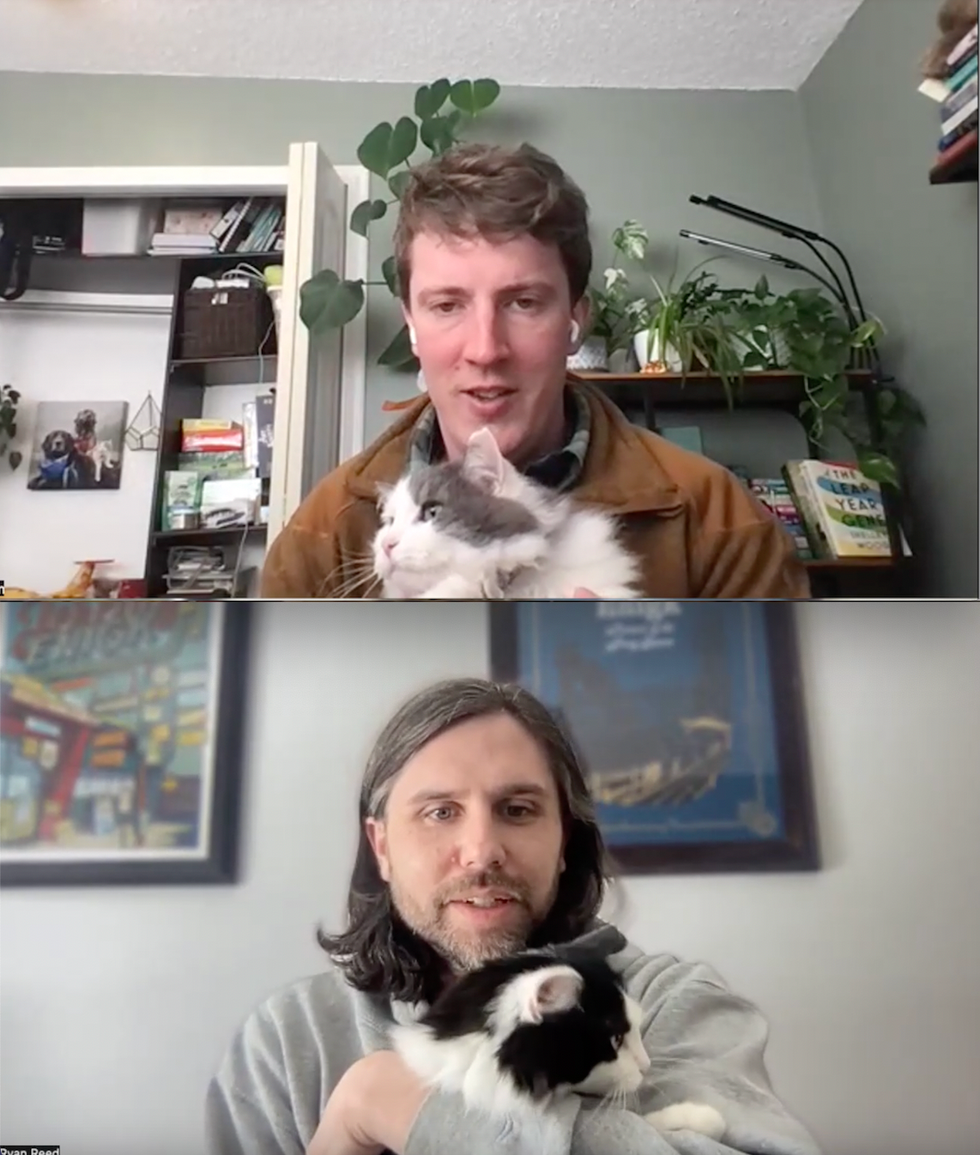 James and Gary chat with Ryan Reed and Tony Photo credit: Ryan Reed
James and Gary chat with Ryan Reed and Tony Photo credit: Ryan Reed

 Rock deterioration has damaged some of the inscriptions, but they remain visible. Renan Rodrigues Chandu and Pedro Arcanjo José Feitosa, and the Casa Grande boys
Rock deterioration has damaged some of the inscriptions, but they remain visible. Renan Rodrigues Chandu and Pedro Arcanjo José Feitosa, and the Casa Grande boys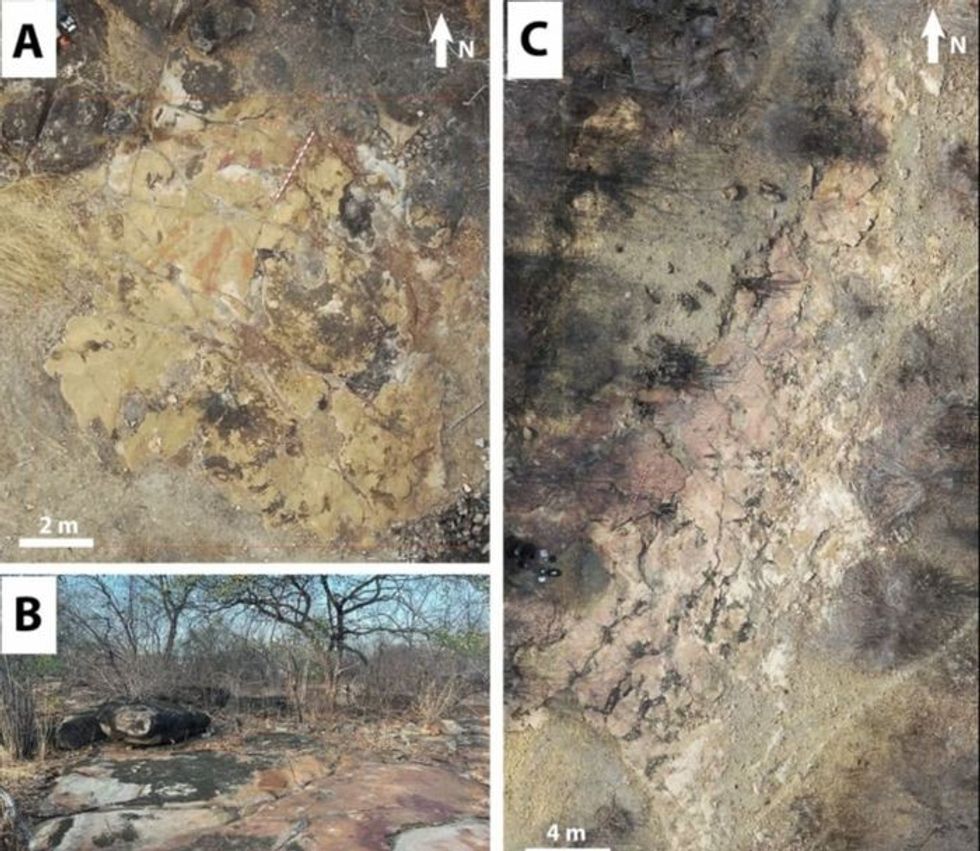 The Serrote do Letreiro site continues to provide rich insights into ancient life.
The Serrote do Letreiro site continues to provide rich insights into ancient life.

 The contestants and hosts of Draggieland 2025Faith Cooper
The contestants and hosts of Draggieland 2025Faith Cooper Dulce Gabbana performs at Draggieland 2025.Faith Cooper
Dulce Gabbana performs at Draggieland 2025.Faith Cooper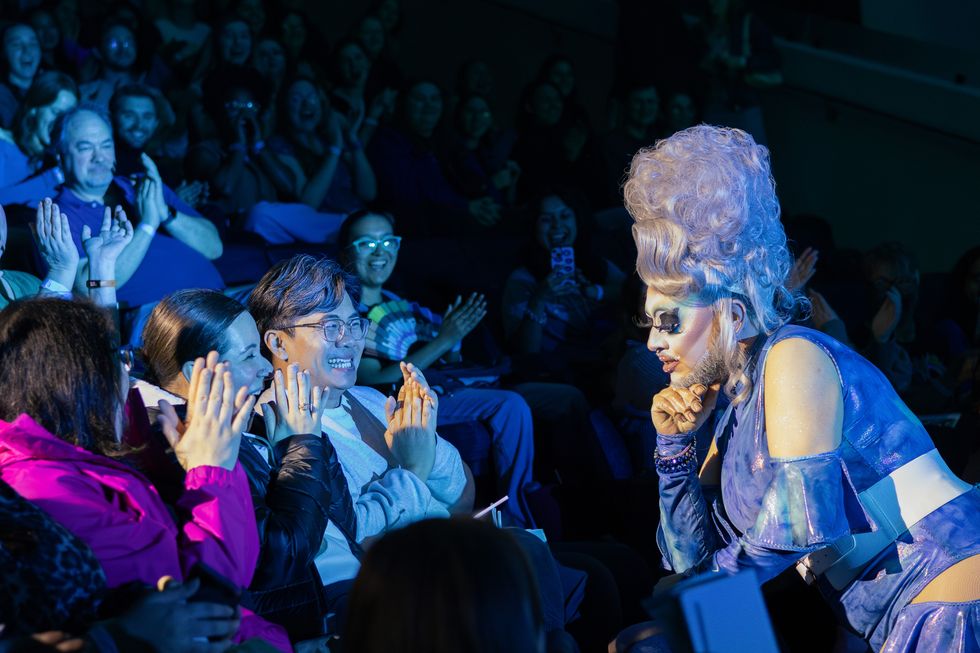 Melaka Mystika, guest host of Texas A&M's Draggieland, entertains the crowd
Faith Cooper
Melaka Mystika, guest host of Texas A&M's Draggieland, entertains the crowd
Faith Cooper


